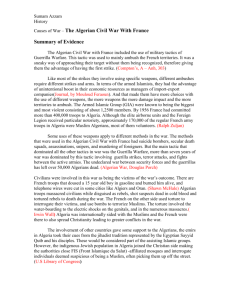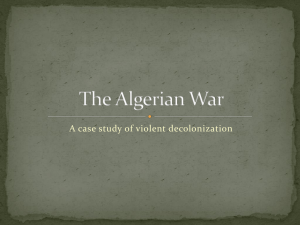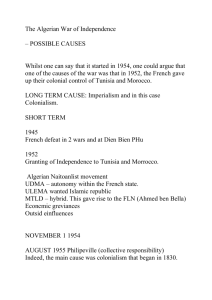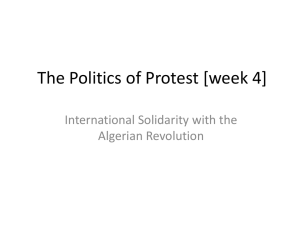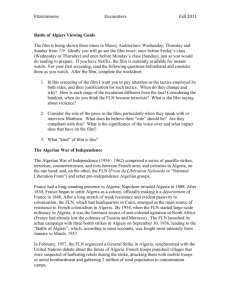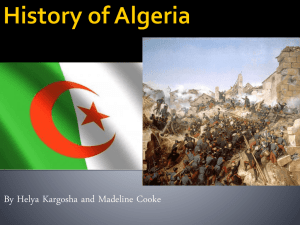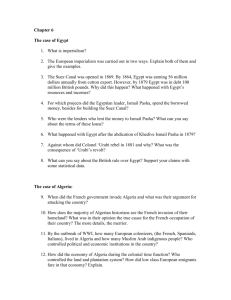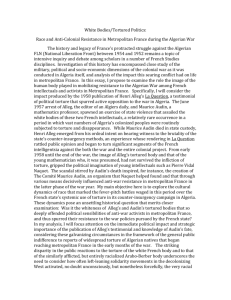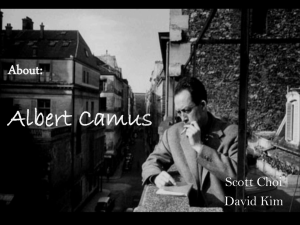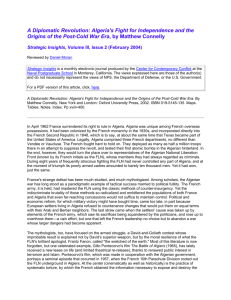Teaching about the French Algerian War during the US Iraq War
advertisement
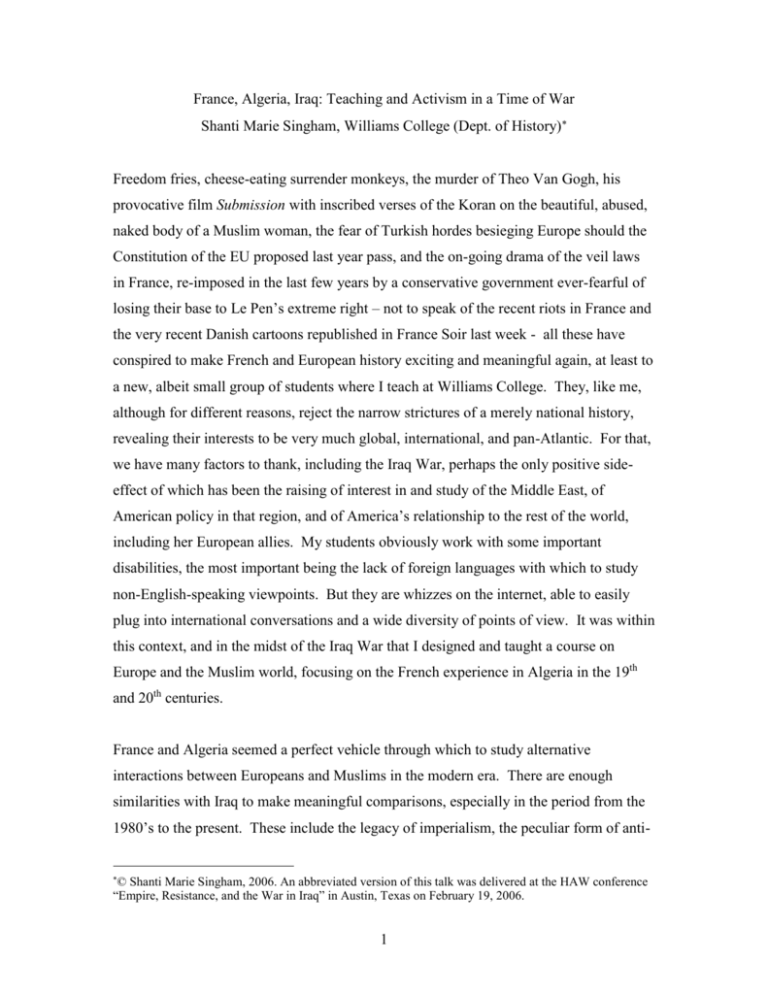
France, Algeria, Iraq: Teaching and Activism in a Time of War Shanti Marie Singham, Williams College (Dept. of History) Freedom fries, cheese-eating surrender monkeys, the murder of Theo Van Gogh, his provocative film Submission with inscribed verses of the Koran on the beautiful, abused, naked body of a Muslim woman, the fear of Turkish hordes besieging Europe should the Constitution of the EU proposed last year pass, and the on-going drama of the veil laws in France, re-imposed in the last few years by a conservative government ever-fearful of losing their base to Le Pen’s extreme right – not to speak of the recent riots in France and the very recent Danish cartoons republished in France Soir last week - all these have conspired to make French and European history exciting and meaningful again, at least to a new, albeit small group of students where I teach at Williams College. They, like me, although for different reasons, reject the narrow strictures of a merely national history, revealing their interests to be very much global, international, and pan-Atlantic. For that, we have many factors to thank, including the Iraq War, perhaps the only positive sideeffect of which has been the raising of interest in and study of the Middle East, of American policy in that region, and of America’s relationship to the rest of the world, including her European allies. My students obviously work with some important disabilities, the most important being the lack of foreign languages with which to study non-English-speaking viewpoints. But they are whizzes on the internet, able to easily plug into international conversations and a wide diversity of points of view. It was within this context, and in the midst of the Iraq War that I designed and taught a course on Europe and the Muslim world, focusing on the French experience in Algeria in the 19th and 20th centuries. France and Algeria seemed a perfect vehicle through which to study alternative interactions between Europeans and Muslims in the modern era. There are enough similarities with Iraq to make meaningful comparisons, especially in the period from the 1980’s to the present. These include the legacy of imperialism, the peculiar form of anti © Shanti Marie Singham, 2006. An abbreviated version of this talk was delivered at the HAW conference “Empire, Resistance, and the War in Iraq” in Austin, Texas on February 19, 2006. 1 Muslim and anti-Arab racism as practiced by Westerners in North Africa/the Middle East, the use of indigenous forces to fight alongside colonial and neo-colonial armies of occupation, the role of the Cold War in the independence struggles, and the military and half-heartedly secular character of Arab nationalism and state socialism in the post-WWII period. Yet there are enough differences to caution students and all of us to shy away from blanket generalizations and to study each Middle Eastern society on its own terms. Major differences between Algeria/France and Iraq/America/Great Britain include, besides the obviously different chronological periods in which their wars and liberation battles have fallen, the huge French settler population in Algeria, the proximity of Algeria to France and the subsequently large numbers of Algerian immigrants in France, and the stronger intellectual and political culture in France, including more independent newspapers and for much of this period, a more genuinely left alternative in politics. Since Algerian independence, new similarities have emerged, including the impact of the disappearance of the Soviet Union and the demise of the Non-Aligned Movement on the entire region, the role of the U.S. backed religious insurgency in Afghanistan in destabilizing the Middle East, and the impact of the Iranian Revolution on the strengthening of Islam as an anti-imperialist ideology of resistance in the contemporary period. Algerian volunteers returning from Afghanistan played an important role in the formation and strengthening of the FIS (Islamic Salvation Front) that was to challenge the reigning FLN with such dramatic consequences in 1991. The FIS won a resounding victory in the first round of legislative elections held in Algeria in October, 1991, the first real national elections since independence [FIS 188 seats; FFS 25; FLN 18], although 42% of the eligible voters abstained following some violence, much violent rhetoric, and a handful of arrests in the summer. The military, however, effectively in power under the rubric of one-party FLN rule since 1962, cancelled the second round of elections in January1992, outlawed the FIS, and changed the leadership of the government. In this obvious subversion of the democratic process, the Algerian government enjoyed the tacit support of both the French and American governments, at least until 1994-95. Partisans of the FLN claimed the FIS was going to “hijack democracy” through their victory; opponents 2 of the government claimed the FLN didn’t want real democracy, but only a “risk-free” version thereof (John Esposito, “Islam and Civil Society,” p.80, in Modernizing Islam, ed. Esposito & Burgat). The similarities to the so-called democratic process in Iraq – and Palestine – today are obvious, as are the more troubling questions of whether these societies were ready for elections in the first place and whether elections can be thoughtful, respectful of minorities, and/or genuine in conditions of extreme social and economic inequality, strong ethnic differences (in the case of Algeria this refers to the large, Berber population in the North East, whose language and culture have yet to be fully recognized as an independent and constitutive part of the Algerian nation), and western interference in the form of strong financial rewards and bribes offered to one side or the other. Similarities and differences – not a bad rubric for doing comparative history, even if it does side-step some of the difficult philosophical questions involved in using history as a guide to future action. Can history predict or only explain, can it be used as a moral compass, does it warn and guide us, or lead us to despair? What is the role of history (and historians) in movements of political activism? As Howard Zinn’s lifework and presentation make clear, history has played an important role since the 1960’s in empowering minorities, women, and the working poor, mainly through the rise of social history, itself linked to Marxist and socialist French historians associated with the Annales school. And although social history has recently seen some decline and has certainly been under attack by a new generation of right-wing historians since the Reagan era (see Appleby, Hunt, and Jacob’s Telling the Truth About History, Gary Nash’s History on Trial and Jon Wiener’s Historians in Trouble) – and these battles have obviously become more intense since the Iraq War as witnessed both by David Horowitz’s various initiatives to legally enforce a ‘balanced’ teaching of history (of which more anon) and by the various attacks on MESA, scholars of the Middle East, and the teaching of Israeli/Palestinian history in the U.S., especially at Colombia University – the work of historians as a whole seems to be of great benefit to activists today, whether it be in pointing to the downfalls of previous imperialist missions in the Middle East (see, for example, Rashid Khalidi’s Resurrecting Empire), the successes of peace movements 3 (see Lawrence Wittner’s “Have Peace Activists Ever Stopped a War?,” and Carolyn Eisenberg’s “Was Anything Learned from Vietnam?” addresses to the AHA, January 2006, for the HAW panel, posted on HNN, http://hnn.us/articles), the extent of American military and economic interests in the region (Chalmers Johnson’s The Sorrows of Empire), and a truthful rendition of the costs, for example, of the establishment of the state of Israel at the expense of the dispossessed Palestinians (see, for example, Ilan Pappé et. al., The Israel/Palestine Question). David Horowitz, Bernard Lewis, and Samuel Huntington have called for a balanced appraisal of Middle Eastern history, insisting that leftists like Edward Said and his followers have distorted and politicized the teaching of the region. They have, unfortunately, received a fair amount of public attention, in the Congress and in the media. What they have forgotten to tell the reading public, however, is that history does not strive for balance – history is not a juggling of political acts or a tolerant smorgasbord of diverse opinions – but rather for truth. Yes, truth is never absolute and is partly, but only partly, perspectival, and yes, a balanced look at all relevant sources is an essential prerequisite of the historical method. In fact, it is just such a balanced method that has resulted in a new view of Israeli history, one much resented by the one-sided historical barons of yesteryear who ignored entire swaths of people and their perspectives and gave instead a jaundiced view of the region. Balance for us is a question of method, not end product; it is linked to our primary sources and our painstaking work in original languages, but the goal surely is to come up with the best, the fullest, the most complex truthful approximation of what the past was truly like and why it was the way it was. The Algerian Revolution is a good example of the way in which historical truth develops, matures, and changes with time, historical distance, and an open appraisal of all sources. It also reveals the great dangers in doing modern history, since so many documents are kept secret for long periods and/or conveniently destroyed, making it imperative to do as much oral history as we can now, before people die, especially since it will be hard to have any paper trails leading to some of the most notorious actions of today. [An excellent example of where contemporary oral history really can make a difference is in Clayton Swisher’s The Truth About Camp David, based on extensive interviewing, 4 showing the ways in which Clinton and others, notably Barak, lied about Arafat’s role in the talks in order to save face in ways that have had a disastrous impact on subsequent peace negotiations. Our current government, however, is all too aware of the danger of such historical revelations. Thus, Mohammed Yousry, a contemporary graduate student of Zachary Lochman, is currently on trial and facing 20 years imprisonment for translating and interviewing the imprisoned Sheik Abdel Rahman in New York. It is a chilling, frightening case. See Lochman “Translating Arabic into injustice,” Los Angeles Times, Feb. 6, 2006, posted on the internet, www.latimes.com.] Algerian history is only recently beginning to be written and studied in depth, thanks especially to the work of Mohammed Harbi and Ben Stora in Algeria and France, a process that was partly set into motion, as many things are in that country so famous for its superb and partly publicly funded film industry, by a movie, Bernard Tavernier’s powerful La Guerre Sans Nom, a three part series showing on French T.V. in the late 1980’s. [This film is unfortunately hard to get in the U. S. and is still not dubbed. Ben Stora’s book Algeria. 1830-2000. A Short History is an excellent overview of this new history.] Tavernier’s movie revealed just how extensive the use of torture by the French army had been during the war. Since then the floodgates have opened. De Gaulle’s clever but unfortunate laws of amnesty of 1964 and 1968, protecting France’s notorious war criminals and the hated OAS, at least enabled old men like Generals Massu and Aussaresses to speak out before death in the 2000’s in a rush of sometimes regretful, sometimes still defiant admissions of their own role in what we would today call war crimes. The portrait revealed is a disturbing one; it is disturbing on both sides. For those, like me who grew up in the Third World, accustomed to glorifying the Algerian war of liberation, Fanon, Sartre, and Pontecorvo’s film The Battle of Algiers, the new historians, while still insisting on the primacy of France’s responsibility – from, the failure to overcome racist barriers to voting rights for Algerians even during socialist governments in France, to the Sétif Massacre in 1945, the use of torture, and the horrific treatment of the povertyinduced army of Algerians or harkis employed to fight France’s dirty war – have 5 profoundly shaken my confidence. Most important has been their documenting of the horrific civil war in Algeria before independence, of the ways in which the victorious FLN imposed their vision of both war and society on reluctant and alternative visions of the future, especially those proffered by the left and by intellectuals, by socialists like Messali Hadj and the MNA or Ferhat Abbas, founder of GPRA. The Algerian Communist Party was disbanded and outlawed by the victorious FLN. The FLN was equally harsh with the harkis, the indigenous soldiers who fought for France, abandoned by France in the great rush of French whites out of Algeria in 1962, only to face horrific and brutal mass murders at the hands of the FLN, leaving scars which were one of the many causes of the brutal civil wars of the 1990’s. For it has been shown that many of the sons and grandsons of the massacred harkis later joined the FIS and a more radical armed wing, the GIA, as non-beneficiaries of the new revolutionary state. Those harkis lucky enough to escape Algeria came to France, only to be housed in ghettos and shanty towns in Lyons, Paris, Marseilles; many never received a pension, and those who have recently been awarded back pensions have nonetheless been given about one-third what a French born soldier received for service during the war. Those scars, too, continue to haunt the French landscape, many of the impoverished and unemployed children and grandchildren of these harkis forming the cadres for the angry youth riots in November and December 2005. One of the most effective ways to learn and teach about the intricacies of the Algerian Revolution from within is through film – placing Gillo Pontecorvo’s The Battle of Algiers(1966) alongside Bourlem Guerdjou’s Vivre au paradis(1998) is an important way of showing how a European and an Algerian, and how someone in the 1960’s and in the 1990’s, view the same phenomenon differently. It is true the subject matter is different, the former dealing with a specific battle in Algiers, the latter dealing with the ways in which Algerian immigrants in France supported the war from abroad, for which they paid dearly in the massacre of protestors in Paris on 17 October 1961. While Vivre au paradis powerfully and realistically depicts the horrors of poverty and immigrant life in Paris in the early 1960’s, the film is as much about how Algerians treated each other – narrated through marital tension in this case – especially about the demanding, undemocratic 6 culture of the war of liberation itself, a culture that not only bred yet suppressed discontent at the time, but that also made the failures of the war of liberation to the Algerian people by the 1990’s all the more disappointing. The failures of the revolutionary, undemocratic, sometimes socialist, always nationalist government of Algeria after independence is brilliantly captured in another recent film, Algeria’s Bloody Years (2003), a project of French and Algerian journalists following the 1992 coup and the subsequent civil war. As to the causes of this failure, there has not been enough study yet to give any clear answers. Structural problems – like the establishment of a oneparty, military, non-secular state, the latter tied to the fateful decision of the FLN to try and co-opt Islam and use it as a non-European unifier during the war of liberation – clearly were related both to the war itself, as well as to the French failure to give Algerians any real experience in self-government during the colonial era. Economic problems were exacerbated by the war, the flight of the French middle class following independence, and Algeria’s continued economic dependence on France as ensured by De Gaulle’s favorable economic treatises with the new government. By the 1980’s, America had replaced France as Algeria’s main consumer of her hydrocarbons and American and IMF involvement in the Algerian economy after the fall in oil prices in the 1980’s was to have disastrous economic effects – much like the effect of IMF policies on Michael Manley’s attempted socialism in Jamaica during the same period – and set the stage for FIS victories, both religious and charitable, amongst the poor and unemployed. Throughout this period, religious, cultural, and regional problems persisted, and international politics greatly affect Algeria’s well-being and independence. The Algerian Revolution, however, is not all a story of gloom and doom. That the war of liberation was successful at all, against great odds, the vast military superiority of France, U.S. support for France, and a large anti-independence settler population, was an amazing feat and one that owed a part of its success, like the Vietnamese a decade later, to the growing anti-war movement in France, orchestrated for the most part by people just like you and me, academics and intellectuals. It was the issue of torture that galvanized French intellectuals into action, first with the disappearance of Maurice Audin, then with the communist Henry Alleg’s The Question in 1958 detailing his own torture at the hands 7 of the French army in Algeria , then with Jean Paul Sartre’s famous commentary “We are all Murderers,” and finally with Simone de Beauvoir and Gisele Halimi’s recording of the rape and torture of Djamila Boupoucha, both in printed form and in the lawcourts. This exposé lead to manifestos (The Manifesto of the 121, October 1960), petitions, marches, and material aid. [Lawrence Wittner has recently posted a useful review of David Schalk’s War and the Ivory Tower. Algeria and Vietnam on HNN that covers much of this material.] One can hope that Seymour Hersh’s important exposures of torture at Abu Ghraib, as well as recent revelations concerning the treatment of prisoners in Guantanamo, will have a similar impact here – it certainly has helped strengthen the antiwar movement. The study of torture during the Algerian Revolution is a good and very teachable moment, with the main sources all translated into English and readily available. Recent work on torture suggests that in Algeria it was not used – as suggested by General Matthieu in Pontecorvo’s film The Battle of Algiers – merely as a rational way of information collecting. Rather, as the real Massu admitted in 2002, after hearing the public revelation of yet another female victim of torture, Louisette Ighilahriz (in her heart-breaking revelations in a number of newspaper articles and then in L’Algérienne (2001)), much of the torture was not that rational. As Fanon had already documented during the war in his The Wretched of the Earth, as Raphaelle Branche demonstrated in her clamorous public dissertation defense in 2000 (published as La Torture et l’armée pendant la guerre d’Algérie, 2001) and as a number of recent works on the historical and psychological uses of torture during war and in the colonies suggests (see, for example, Jonathan Glover’s Humanity, A Moral History of the Twentieth Century, and Chuck Tilly’s The Politics of Collective Violence) torture was not used in Algeria as a means to an end but rather was “the goal itself” (see Josh Cole, “Intimate Acts and Unspeakable Relations: Remembering Torture and the War for Algerian Independence,” p. 131, in Alec Hargreaves ed. Memory, Empire, and Postcolonialism. Legacies of French Colonialism). Intimately linked to terror and racism, as well as to the inherently dehumanizing nature of a colonial war of occupation, French torture unwittingly strengthened the opposition even as it eroded the long-term potential for a government of 8 national unity and reconciliation in its aftermath. The implications for our own use of torture in Iraq have yet to be fully exposed and explored. As we are having our history wars today – over Iraq, Israel, and the politicization of the field of history itself – so too are the French. The recent hullabaloo over the “law of the repatriés” of February 2005, passed by a largely conservative Assembly but including a handful of socialists asleep at the wheel, requiring French professors to teach about the positive benefits of colonialism, reveals the extent to which the wounds of the Algerian Revolution continue to haunt French society. In fact, the law was a clever package, revealing the best and worst of conservative Gaullism – including as it does recognition at long last of the service of the harkis to France and the guaranteeing of minimum pensions to them or their families, while at the same time trying to whitewash the colonial past free of the tortures, massacres, and racism for which it is more properly remembered by the mass of Algerians. It was this that tricked lazy socialists into going along with its passage a year ago, only to be called to task by the quick action of French historians like Claude Liauzu who circulated petitions protesting this law. Fearful of the effect of this law on the angry youngsters in the banlieues, Chirac recently tried, unsuccessfully, to have the law abrogated in the Assembly, although he did get France’s high court to declare it illegal and non-enforceable. Another similar debate is going on right now over Chirac’s recent decision to name May 10 a national memorial day against slavery. Even though in this case the government is on the side of a good ‘cause,’ some French historians are protesting what they consider to be undue government interference in the direction of creating an ‘official’ history and memory, and they will be having a big conference on this in two weeks at the Sorbonne (“Sur les usages publics de l’histoire,” Sorbonne, 3 March 2006). The current debate about these laws is, indeed, as much about the urban unrest of the last few months, and even the conflagration in the Middle East unleashed by the U.S. war against Iraq, as it is about memories of the Algerian War. These debates are also very much about the electoral politics of Sarkozy versus Villepin versus whomever the socialists eventually pick to run in the next election versus the ominous, ever-present 9 danger of the growing strength of Le Pen’s party. Like us, French academics are speaking out – in blogs, in the press, and at conferences – protesting official history, protesting the characterization of France’s underclass revolts as aspects of the threat of “radical Islam,” insisting on uncovering the true character of life – in the ghettoes, in Algeria, then and now – and uncovering the role of corporate, media, and political intrusions in the setting up of false dichotomies – like those of multiculturalism versus the republican model of integration in France, or of Western democracy versus Islamic ideals – that undergird the dangerous politics of today. [For an excellent set of articles by leading French scholars such as Michel Wievorka, Olivier Roy and Jocelyn Cesari as well as Alec Hargreaves, Paul Silverstein and others, on the recent French riots, see http://riotsfrance.SSRC.org.] Like us, they have not yet – as they and we did in the 60’s – figured out ways to take this information out to reach a broader public, and transform that educated public into an active movement of protest. Our task is the more urgent, since we are the ones who started the war in Iraq, and it is our government that props up the Israeli state; we also benefit and profit more from the oil and impoverishment of the peoples of the Middle East. Unlike French academics, we have some important disadvantages – we live in a much bigger, more decentralized country, we have less social capital and power than intellectuals do in France, and we have a much less free and a weaker press whereby to influence fellow Americans. We do, however, have our Colleges and Universities. In this, the charges of the right are right – leftists and liberals do have great influence in most of the colleges and universities in this country, thanks to the opening up of higher education in the aftermath of the revolt of the 1960’s. It is time for us to think creatively about using this power – and not just in the classroom, but with teach-ins, national days of protest, the passing of anti-war and impeachment resolutions in our schools in conjunction with the movement of towns to do likewise, holding solidarity filibusters with the courageous Princeton students who enacted one last Spring, descending on Congress in anti-war t-shirts, publishing manifestos in newspapers and on-line, showing anti-war movies, like Fahrenheit 911, Uncovered, Soldiers Pay, Why We Fight and accompanying them with discussion, and encouraging our colleagues and students to work for congressional and senatorial 10 candidates determined to end the war in the upcoming primaries this spring and summer and the elections in November– in short, to do everything we can so that the world, at least, will know how strongly we protest the inhumanities committed daily in our names. 11
